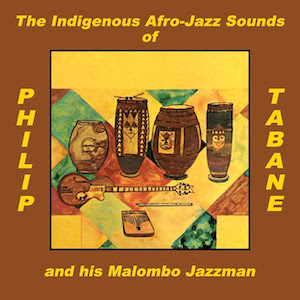
Philip Tabane – The Indigenous Afro-Jazz Sounds of Philip Tabane and His Malombo Jazzman
We Are Busy Bodies (WABB- 090) – 9 July 2021 (Vinyl Only Re-issue)
2018 saw the loss of one of South Africa’s most noted and influential musicians when Philip Tabane died in Pretoria, aged 84. Tributes poured in, including this from the SA Department of Arts and Culture, who tweeted, “We are deeply saddened by the news of the passing of one of South Africa’s most innovative jazz guitarists described as a quintessential African performer, Dr Philip Tabane.” Plaudits such as these, however, would have been an anathema to him, as evidenced in his words given in an interview “The jazz label – or any other label – has never worked in my case. Once, I went to play at a competition in Durban and in the end I was given a special prize because I could not be categorised. To this day, they still cannot categorise my music.”
Notwithstanding such potential anomalies, one thing all are agreed upon is that he left an indelible legacy and was a true inspiration for future generations.
Born in 1934, he was proficient on the pennywhistle by the age of 7, was taught guitar by an older brother and received his first guitar, a Framers’ model, as a gift from his mother in 1960. Proficient also on the harmonica, marimba, thumb-piano, malombo drums and bass-guitar, in his early years he was heavily influenced by Ndebele and Sepedi traditional music and marabi, the music of the urban slums and settlements, played by the band in which his elder brothers performed.
It was his mother Matjale, a spiritual healer, however, who was his first mentor, and the person from whom he absorbed the music of his calling, and the desire to retain the spiritual link with ancestry. Such was the influence that it affected the naming of the genre of music for which he is remembered, Malombo.
As a young man in the 1960s, Philip created and led the group Malombo, with the music heavily influenced by the traditional chants and rhythms reputed to have spiritual healing powers. The instrumentation was unconventional, to say the least, African drums and hand percussion interplaying with Tabane’s unique electric guitar, vocal, and flute sounds.
The PR accompanying the release states that having begun in 1964 as a flute, guitar and drums trio, by the time The Indigenous Afro-Jazz Sounds of Philip Tabane and his Malombo Jazzman was recorded, Tabane had replaced his bandmates and introduced Gabriel “Sonnyboy” Thobejane. The release was a seminal one, expanding the frontiers of African music.
All but one of the tracks presented are instrumental, illustrating his distinctive style in which other sounds are layered over his idiosyncratic guitar playing. The gently evolving opening track Kathloganao, a nigh-on-7-minute slice of delight in which the tempo ebbs and flows with bewildering irregularity exemplifies this over-layering to perfection.
A common technique used by Tabane is to create soundscape ambiences between his guitar and the drummer, often using the third player to create percussive sounds to emulate birds, squirrels and other sounds of nature. You can hear this to good effect in Inhliziyo. Man Feeling has a distinctly Western Blues feel, the train sounds created by his guitar particularly effective, with the drum-beats played in a style that possibly defies description, such is their random pattern. Tabane’s guitar fairly chugs along on Tsela with the drums, at times, seemingly being used in a call-and-response way with it, intriguing and immersive.
In the sole track with words, Ke Utlwile, meaning “I’ve had enough”, Tabane sings about his sister’s baby, his high-pitched vocals redolent of an Iman or even a practitioner of plainsong, before the guitar and drums up the tempo in a structure which is somewhat cyclical. Unlike traditional malombo, where the lead singer (lelombo/lelopo) and initiate practitioner leads the song, and the other initiates or malombo/malopo respond, there are no additional singers here. A hauntingly beautiful track, nevertheless.
From here, the music takes on a completely different hue. There is a definite affinity between Babedi and Dithabeng, as stylistically and sonically, there is a dramatic change. Both tunes open with flute before finger-piano comes to the fore, and then guitar also helps spin a gossamer-like web of aural relaxation before returning with pleasing symmetry to end, once more, on the flute. Doubtless, inspired by his childhood days listening to the call of the wild birds and the soothing sounds made by the gentle, flowing waters of the Moretele, these are enchanting tracks, as is the final offering, Mahlomola. Very similar to the previous two tracks, drums also take the previously pastoral atmosphere one step closer to musical nirvana (to mix Continental metaphors).
Philip Tabane has rightly been recognised in his own country, being both the recipient of the South Africa Music Awards (SAMA) Lifetime Achievement Prize and, in 1998, being awarded an honorary Doctorate in Philosophy of Music from the University of Venda for his contribution to the music industry.
This album is truly an exceptionally rewarding listen which offers subtle nuances on each repeated play.
A word of warning, however, for those conversant with Tabane’s 1991 Unh album, I would venture to suggest “chalk and cheese” might be an appropriate phrase.
Remastered from original files by Noah Mintz, it will be released on July 9th 2021 and is limited to 500 copies, from the We Are Busy Bodies Bandcamp store here. At the time of writing, there are 47 copies left (Not available digitally).
Pre-Order via https://wearebusybodies.bandcamp.com/album/philip-tabane-the-indigenous-afro-jazz-sounds-of

